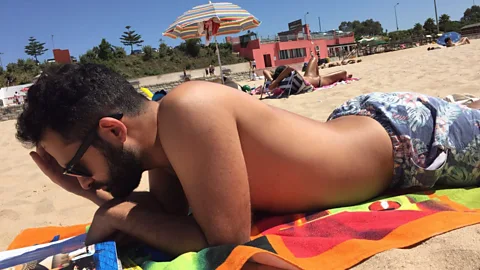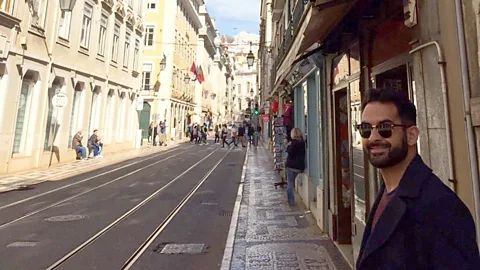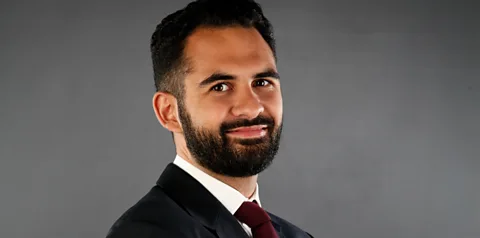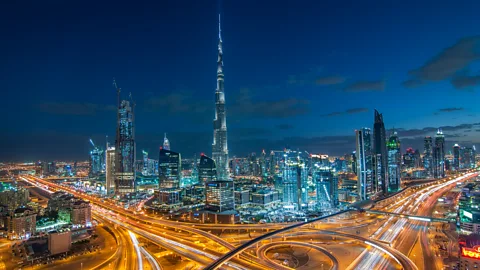Working between liberal Lisbon and conservative Dubai
 Tariq El-Asad
Tariq El-AsadFor the past two years, realtor Tariq El-Asad has straddled life between two dramatically different cities: Lisbon and Dubai.
Based in Lisbon, the 30-year-old founder and managing director of Tamea International, a real-estate firm, enjoys leisurely lunch breaks outside and walks past ancient architecture in one of the world’s oldest cities. Then every four weeks, he takes an eight-hour flight to the much-faster paced Dubai — he spent 14 years living in the Gulf as a child, with some of that time in Dubai — and now spends close to two weeks at a time meeting clients who are interested in buying property in Portugal.
 Tariq El-Asad
Tariq El-AsadHis company’s main purpose is to help foreigners move to Portugal through the country’s Golden Visa programme. Non-residents who invest 500,000 euros ($568,255) in Portuguese property, which he helps source, can obtain a visa that allows them live, travel and work in the country and in other parts of Europe. There’s a growing demand for this type of access from people in Brazil, South America and the Middle East, among other places, he said. Many people he comes in contact with simply want to be able to move freely throughout Europe.
Travelling back and forth between Portugal and the United Arab Emirates involves more than just getting off the plane and getting to work. It takes a bit of a mental adjustment for El-Asad, who prefers the quicker pace of Dubai to the laid-back feel of Lisbon.
Changing lifestyle
Born in London, where he’s lived on and off throughout his life, El-Asad is used to a fast-paced life. In 2014, after learning about Portugal’s Golden Visa programme, and seeing a business opportunity to help people find real estate there, El-Asad thought he could get the best of both words — a fulfilling work life and a calmer home life. That has turned out to be the case.
“There’s more socialising with friends, impromptu dinners and lunches and the beach is less than 30 minutes away,” he said.
Still, it took him a few months to adapt to the slower pace. Most people get into the office at around 10:00, take a two-hour lunch at noon and then leave for the day by 18:00. He would get frustrated by his inability to get anyone on the phone in the early afternoon.
“It's hard to get a hold of people on the phone between 12:00 and 14:00 because they’re having lunch,” he said. “You lose two hours. That was tough at first. In London, you’re eating a sandwich and typing with the other hand."
 Tariq El-Asad
Tariq El-AsadBut El-Asad has adapted. While he doesn’t take two-hour lunches, he often sits outside during his hour break instead of at his desk as he did when he worked at a London real estate development firm.
On-the-go Gulf
The pace in Dubai is much more like London or New York, where people are always on the go. In Dubai, he’s at his office — solely open so he has a desk and meeting place when he’s in town — by 8:30 and then it’s off to client meetings until about 17:30. People respond quickly to emails, he eats at his desk and he squeezes in as much as he can into his days.
He also says that Dubai is much different today than when he was a kid, when it was a far quieter place. Now the city is a bustling cosmopolitan centre, with a real business climate and robust entertainment, hospitality and real-estate sectors. There are banks, investment firms, corporations and other types of institutions that you’d see in other major urban centres.
“The change in the last 15 years has probably not happened anywhere else in the world,” El-Asad said.
There are also different religious and cultural rules in Dubai than in Lisbon — one is a Muslim country, the other Christian — which adds another layer to navigate. Dubai is much more conservative; Muslims don’t drink and public display of affection is outlawed. Meanwhile, Lisbon is extremely liberal.
 Umar Shariff Photography/Getty Images
Umar Shariff Photography/Getty ImagesIt is something El-Asad is keenly aware of when navigating business lunches or dinners with clients. In Portugal, colleagues expect that drinks will be ordered. In Dubai, by comparison, juice and tea are the beverages of choice.
“I would never, and have never, order alcohol at a meeting in Dubai,” he said. If the meeting is at someone’s office or a home, not accepting an offer of tea is considered impolite, he explained.
Laid-back Lisbon
After his two-week-stints in Dubai, it typically takes El-Asad two days to unwind and fall back into the pace of Lisbon. “Slowing down seems less natural for me,” he said. “It takes time to adjust. I can’t go immediately back and be prepared for the difference, even doing it time after time.”
But he does love the energy and enthusiasm in Lisbon, plus, he said, the cost of living is lower. It’s also not as rainy as London or as hot as Dubai, so El-Asad spends more time outdoors.
What makes all the travel worthwhile? He gets both yin and yang and the best of both worlds — the laid-back pace of Lisbon and the always-working vibe of Dubai and London.
“It keeps me from becoming stagnant,” he said about his travels. “And there’s always the prospect of meeting people and see things from a fresh perspective, which often leads to discovering new opportunities.”
